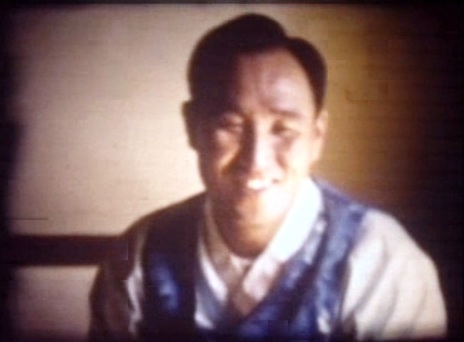![]()
The Words of Sun Myung Moon From 1966
|
|
The Words of Sun Myung Moon From 1966 |

Sun
Myung Moon, 1960
If you insist that your family exists for you, the society exists for your sake, your nation exists for your benefit, and the world exists for you, your own direction will be destroyed.
You should put out a feeler to your conscience quietly. Then, you should listen to what it would say. When you see a poor person while walking the street, you should hear what your conscience would tell you. What kind of connection should I have with this person? Suppose, you met someone that you would never imagine meeting, nor would your ancestors in the last several thousands of years have ever thought of meeting. When you see the poor person who is hungry, your conscience tells you, "Give all your money in your wallet to this man." Even if you have only three hundred won in your wallet, your conscience tells you to share some of it with him.
Then, you would give one hundred won to this person with the result that you now only have two hundred won in your pocket. Then, you continue to walk the street; you encounter someone even more miserable than the person you just saw. Immediately, your conscience shouts, "Help this man." You follow the voice of the conscience and give this man one hundred won. After that, you meet another person who is more miserable than the previous two. Then, your conscience orders you, "give all you have left." Following the conscience, you give the rest of the money in your wallet. You are now penniless. Again, you face another miserable person. Your conscience orders you saying, "at least, you should clothe the man with the clothing that you wear. So, you should take off your clothing and give them to him." This is the nature of the conscience.
One day, you may be proud that you did something good once. However, your conscience would grumble to you. Your conscience would never praise you for that by saying, "You succeeded by doing good deeds and reached your goals. So, you don't need to do any more. Just enjoy, and cheer 'Mansei' for yourself or sing a song of a hero's welcome." On the contrary, it would not let you be idle. Your heart continues prodding you, saying, "Do something. Do it now. Act now." It reminds you to continue doing good deeds. There is no end for the conscience in doing good deeds. This is the world of the heart.
Then, does your conscience push you to do good just for your friends that you love? It does not. Your heart commands that you love your family and environment, live for the sake of your country, and live for the world. By engaging in give and take, you will create a reciprocal basis. Based on the public principle of Heaven and earth, if you engage in the good give and take action, whatever you give out at this time will remain even after billions of years. This is why people always speak about charity. People everywhere and throughout history have been teaching the principles of such cause and effect. Christianity teaches love and charity. Buddhism edifies benevolence and mercy.
What the religions have been teaching is that you should first sacrifice yourself in order to serve others. For whom should you make such a sacrifice? It is not for your own sake. But, you do it for something greater than yourself.
Let's look at the life of Jesus. He was chased away wherever he went at the time. He was persecuted and hunted down; thus, Jesus was chased to the cross and passed away. However, Jesus did not try to take revenge against the enemies. Instead, he died for the sake of the enemies and the people of the world, while praying for them. Looking at this, he is different from other saints in history. Even though he died alone, he died for the sake of the world. He had his conviction that he would connect with the entire humanity and the world history in order that he could take responsibility for humankind forever. He wanted to give his own blood that he was shedding on the cross for the sake of the people of his age.
With this conviction and attitude, he was able to give his blood that he shed to humanity for thousand and tens of thousands of generations transcending history and distances. He gave it in the public place where God could recognize it. He gave from the position that God could publicly have recognized. From this meaning, he said, "It is finished." (John 19:30) Jesus gave perfectly and was recognized by God perfectly. Since he perfectly gave and perfectly received, he can come again when the age demands his return.
He thought about the world as he was breathing his last breath on the cross. At this moment, because he held on to his connection with history and established the standard through which even God was moved to tears, Jesus was able to start a new history and was resurrected from his tomb even though he died on the cross.
At the moment when he was dying and at the place where his life and death was determined, he was almost gambling with his life, yet never lost his virtue. While looking forward to the hope that his heart aspires, he embraced the world and leaned on God as he went the path to his death. Thus, even though Jesus perished, his thought and will would reappear before tens of thousands of people. Moreover, his thought and will did not just end for the tens and thousands of people of his age. But his thought and his will became the motive that caused countless humanity throughout history to long for him as their bridegroom.